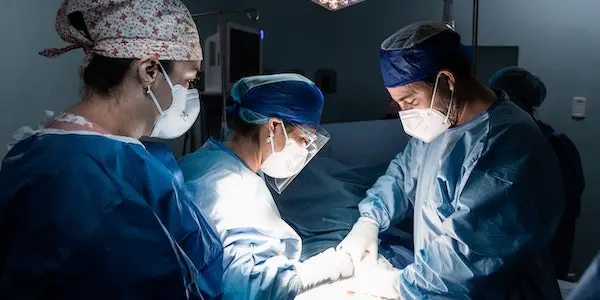What Does a Gastric Sleeve Leak Feel Like? People are often concerned about what it feels like to experience a gastric sleeve leaking. Luckily, this type of surgery is relatively safe. After all, the physician will inflate the stomach before the procedure. Once that is complete, the surgeon will perform the rest of the procedure without any risk of a gastric sleeve leak. However, if you have any fears, you should speak with a specialist.
What Does a Gastric Sleeve Leak Feel Like?
After having gastric sleeve surgery, many patients experience a leak after a few days. The leaking can be painful and cause discomfort. It typically happens near the esophagus and upper third of the stomach. Most gastric sleeve leaks occur within three days of surgery. Symptoms of a leak may include nausea, vomiting, fever, chills, or diarrhea. Fortunately, this condition is not life-threatening.
What does a gastric sleeve leak feel like? If the leak persists, patients should consult a physician immediately. In most cases, leaks will be cured by IV antibiotics. In more severe cases, a surgical repair is required. During this procedure, a new anastomosis is made between the small intestine and gastric pouch. The surgery typically takes about six weeks to complete.
What does a gastric sleeve leak feel like? Although leaks are very rare after a gastric sleeve surgery, patients should be aware of the possibility. During the recovery phase, the patient should avoid taking aspirin and non-steroidal anti-inflammatory medications. Afterwards, the patient should not take any medications that may trigger the leak.
If a gastric sleeve has a leak, the digestive fluids can escape the stomach and enter the abdominal cavity. This is painful and may result in the damage of surrounding tissues and organs. It’s rare to experience gastrointestinal leakage following a gastric sleeve surgery, but if it does happen, you should seek medical attention as soon as possible.
What does a gastric sleeve leak feel like? The leak can be caused by both mechanical and ischemic factors. A mechanical cause is caused by a stapler misfire while an ischemic cause is caused by a defect in the tissue. A leaking gastric sleeve is likely to cause a leak in one or both sides of the stomach.
Symptoms of a leaky stomach may include rapid heartbeat, abdominal pain, or dizziness. In severe cases, patients may also experience abdominal distention. These symptoms may occur before the leak is detected. A leaky stomach can also lead to a stomach abscess.
What does a gastric sleeve leak feel like? After gastric sleeve surgery, you should avoid caffeine, alcohol, or other liquids that are too gaseous. Consuming too much liquid after surgery can result in a sleeve gastrectomy. Lastly, you should avoid smoking for several days following your gastric sleeve surgery. If you smoke, you should stop immediately. Smoking can affect the healing process.
If you have experienced gastric sleeve complications, you should consult a physician as soon as possible. Your healthcare provider will explain possible risks and complications, as well as alternative treatments. He or she will also give you post-surgery instructions.
Symptoms vary greatly depending on the type of leak. Early leaks can manifest in sudden abdominal pain, fever, and tachycardia. Intermediate leaks can be more subtle. Most people will not feel any symptoms of a gastric leak unless it is severe.
Gastric sleeve patients often experience a leak after surgery. The condition is called stenosis. Stenosis narrows the tapered tube of the stomach, which creates a narrow channel a few millimeters across. The classic stenosis story involves a patient who initially tolerated solid foods, but later vomited them. The patient may also be able to tolerate liquids, but the condition may progress until the patient is unable to digest solids at all.
Gastric Sleeve Leak Symptoms
Although gastric sleeve leak symptoms can vary depending on when the leak occurred, the majority of patients experience a rapid increase in heart rate and a mild or high fever. However, some patients will not experience any symptoms at all. Physicians can make the diagnosis by performing blood tests and x-rays.
Although late gastric sleeve leaks are uncommon, they are still a major concern and require aggressive medical treatment. Patients should consult a multidisciplinary team, including a surgeon, radiologist, intensivist, and nutritionist, to ensure that the best treatment is available for their condition.
In the most severe cases, patients may require revision surgery. In rare cases, the leaking can be a life-threatening emergency, requiring an emergency laparotomy. Other serious complications can result from the continued leaking. Sometimes the staple line leak happens as a result of a surgical error and can lead to an abscess or small collection of fluid.

Gastric sleeve leak symptoms vary by the location and size of the leak. Patients should contact their doctor immediately if they notice a leak. Prompt diagnosis will help avoid more serious complications. Early leaks will also prevent the need for additional surgery. If the leak persists, a CT scan may be necessary.
A 65-year-old patient developed gastric sleeve leak symptoms two years after her VSG. She was suddenly experiencing pain and soreness in her lower abdominal area. She also developed a high fever and pain in her left shoulder. She had a history of hypertension, diabetes, and COPD. Seven laparotomies were performed to correct the leak.

